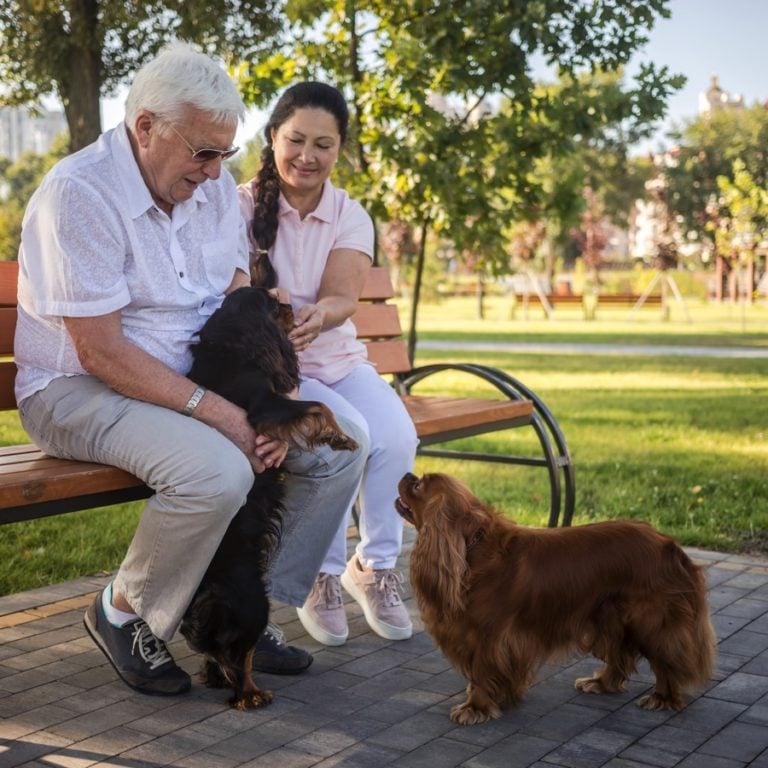1
00:00:03,284 –> 00:00:04,442
Filipa: Olá, boa tarde!
{{Filipa: Hello, good afternoon!}}
2
00:00:04,847 –> 00:00:08,548
António: Boa tarde! Como está? Já não a via há algum tempo.
{{António: Good afternoon! How are you doing? I haven’t seen you in a while.}}
3
00:00:09,060 –> 00:00:12,584
Filipa: É verdade, já não vinha aqui com o Bobby há semanas.
{{Filipa: It’s true, I haven’t been here with Bobby in weeks.}}
4
00:00:12,925 –> 00:00:15,674
António: Nota-se! Ele estava mesmo a precisar.
{{António: It shows! He really needed it.}}
5
00:00:16,051 –> 00:00:18,750
Filipa: Sim, ele está com muita energia acumulada.
{{Filipa: Yes, he has a lot of built up energy.}}
6
00:00:19,255 –> 00:00:21,830
António: A minha Princesa também está elétrica hoje.
{{António: My Princess is also “electric” today.}}
7
00:00:22,260 –> 00:00:27,410
Nós temos vindo quase todos os dias, mas não temos encontrado muitos cães para ela brincar.
{{We’ve been coming almost every day, but we haven’t found many dogs for her to play with.}}
8
00:00:27,915 –> 00:00:31,048
Filipa: O tempo não tem estado muito convidativo, na verdade.
{{Filipa: The weather hasn’t been very inviting, actually.}}
9
00:00:31,588 –> 00:00:34,054
António: Não tem, não. Mas hoje está ótimo!
{{António: No, it hasn’t. But today it’s great!}}
10
00:00:34,402 –> 00:00:36,554
Filipa: Está um autêntico dia de verão!
{{Filipa: It’s an authentic summer day!}}
11
00:00:37,057 –> 00:00:38,712
António: Era impossível ficar em casa.
{{António: It was impossible to stay home.}}
12
00:00:39,155 –> 00:00:41,954
Filipa: Temos de aproveitar, enquanto a chuva não volta.
{{Filipa: We have to enjoy it while there’s no rain (the rain doesn’t return).}}
13
00:00:42,323 –> 00:00:44,838
António: Há previsão de chuva no final da semana, não é?
{{António: There is a forecast of rain at the end of the week, right?}}
14
00:00:45,549 –> 00:00:47,964
Filipa: Dizem que sim, a partir de quinta-feira.
{{Filipa: That’s what they say, starting on Thursday.}}
15
00:00:48,625 –> 00:00:54,098
António: Quando chove, é uma chatice para passear os cães. A minha fica muito impaciente!
{{António: When it rains, it’s a drag to walk the dogs. Mine gets very impatient!}}
16
00:00:54,749 –> 00:01:00,108
Filipa: O meu odeia chuva. Recusa-se a sair de casa. É muito difícil.
{{Filipa: Mine hates rain. Refuses to leave the house. It’s very difficult.}}
17
00:01:00,958 –> 00:01:03,806
António: É engraçado como cada um tem a sua personalidade!
{{António: It’s funny how each one has its own personality!}}
18
00:01:04,255 –> 00:01:05,313
Filipa: Sem dúvida!
{{Filipa: Without a doubt!}}
19
00:01:05,754 –> 00:01:07,274
António: São a nossa melhor companhia.
{{António: They are our best companion[s].}}
20
00:01:07,630 –> 00:01:12,176
Filipa: São mesmo. E o António, está melhor daquele problema no joelho?
{{Filipa: They really are. And António, are you better from that knee problem?}}
21
00:01:12,660 –> 00:01:14,706
António: Estou muito melhor, desde que fui operado.
{{António: I am much better, since I was operated [on].}}
22
00:01:15,437 –> 00:01:18,926
Ainda ando a fazer fisioterapia, mas estou muito melhor.
{{I’m still doing physical therapy, but I’m much better.}}
23
00:01:19,309 –> 00:01:22,649
Filipa: Estes passeios no parque também devem ajudar, não é?
{{Filipa: These walks in the park should also help, right?}}
24
00:01:23,004 –> 00:01:26,258
António: Sim, o médico aconselhou-me a fazer caminhadas.
{{António: Yes, the doctor advised me to go on hikes.}}
25
00:01:26,691 –> 00:01:28,361
Filipa: Fazem bem ao corpo e à mente!
{{Filipa: They are good for the body and mind!}}
26
00:01:28,730 –> 00:01:30,968
António: Eu já não vivo sem as minhas caminhadas.
{{António: I can no longer live without my walks.}}
27
00:01:31,352 –> 00:01:35,341
Filipa: Continue assim. Qualquer dia, até já corre com a sua Princesa.
{{Filipa: Keep it up. One of these days, you’ll be running with your Princess.}}
28
00:01:35,692 –> 00:01:36,557
António: Espero que sim.
{{António: I hope so.}}
29
00:01:37,199 –> 00:01:40,637
Filipa: António, foi bom falar consigo, mas tenho de ir andando.
{{Filipa: António, it was good talking to you, but I have to get going.}}
30
00:01:41,063 –> 00:01:44,339
António: Veja se aparece mais vezes, Filipa. O Bobby vai gostar.
{{António: See [to it that] you show up more often, Filipa. Bobby will like it.}}
31
00:01:44,751 –> 00:01:48,289
Filipa: Ele adora! Bobby, vamos! Até à próxima, António.
{{Filipa: He loves it! Bobby, let’s go! Until next time, António.}}
32
00:01:48,807 –> 00:01:49,965
António: Adeus, até à próxima.
{{António: Goodbye, see you next time.}}
 We respect your privacy and have a ZERO TOLERANCE for spam.
We respect your privacy and have a ZERO TOLERANCE for spam.
















It did sound more like the people in shops etc that I talk to, I want to hear more language as I often don’t understand what is said because it’s so fast,
Muito bom diálogo! Estou a ver. Tento ver novelas de televisão, mas os actores falam tão depressa e emocionalmente que só se compreendem frases curtas. Gostaria de sugerir uma ideia, talvez pudéssemos pegar numa simples novela e analisar o diálogo a partir daí? Se não for contra a lei, é claro. Muito obrigada.
Olá, Svetlana. Obrigado pelo comentário e sugestão. Não tenho a certeza, mas penso que os direitos de propriedade intelectual possam ser um problema aí. Em todo o caso, tentamos que os nossos diálogos sejam variados e explorem muitas situações diferentes do dia a dia, um pouco como as novelas. Se calhar, precisamos de um pouco mais de drama também! 🙂
Hi. Great dialogue, thanks. Why does Filipa use ‘o’ in this sentence: E o António, está melhor daquele problema no joelho?
In Portuguese you use a definite article before someone’s name (in most contexts), so for men you add “o” and for women you add “a”. A literal translation (the Antonio”) would sound funny in English, but it’s normal in Portuguese. 🙂
Thanks Molly. But in the dialogue, she doesn’t use o Antonio all the time. Just in that one sentence. The rest of the time she just uses his name, Antonio.
Ah sorry, I see what you’re saying. It’s because in the other sentences she is using the “vocative” case (this is one of the contexts where the definite article is not used).
In the question, however, she is using his name to stand in for “you” (see this Learning Note for more on that: Formal vs Informal treatment – the part where it discusses replacing você with the person’s first name).
In the question, when she uses o Antonio, it is grammatically as if she is talking about him in the 3rd person (like saying “And Antonio, is he feeling better?”) rather than directly addressing him like she did when saying goodbye (Até à próxima, António – Until next time, Antonio!).
Confusing, I know, but keep an eye out in other dialogues and you’ll start to notice when the definite article is used or not in other contexts.